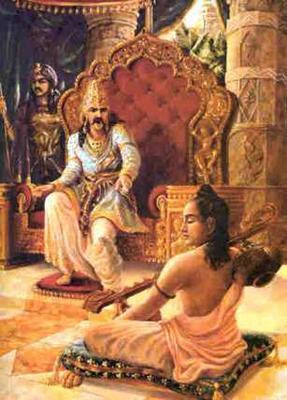Prabhupāda: Oh. [break] ...Dakṣa accused Nārada that "My sons were not out of the three kinds of debts." One debt is debtor to the saintly sages. Just like we are reading Śrīmad-Bhāgavatam, we are indebted to Vyāsadeva. He has given such literature, and we are taking advantage of it. As such, especially the brāhmaṇas, they have got indebtedness to big sages and saintly person. They receive knowledge from them. And they are indebtor to the demigods. Therefore they have to perform yajñas. And they are indebtor to their father because the father has brought them to this world. So in this way, especially a brāhmaṇa is indebted to demigods, the past sages, and the father. So the indebtedness to the sages is performed by becoming brahmacārī, and to the demigods by offering sacrifices, and to the father by begetting children, to continue the progeny. So Nārada Muni was accused that "You keep them indebted to these principles, so how they can be liberated? Simply by dressing like you, (laughs) a mendicant?" Accusing. But perhaps he did not know. There is another version in the Śrīmad-Bhāgavatam,
devarṣi-bhūtāpta-nṛṇāṁ pitṛṇāṁ
nāyam ṛṇī na ca kiṅkaro rājan
sarvātmanā yaḥ śaraṇaṁ saraṇyaṁ
gato mukunda parihṛtya...
[Śrīmad-Bhāgavatam 11.5.41]
Anyone who has fully surrendered to Kṛṣṇa, he is no more debtor to anyone. And Kṛṣṇa says that "You surrender to Me, and I shall keep you protected from all kinds of..." Because if you don't repay your debts, then you become sinful. But Kṛṣṇa says, "I shall protect for all kinds of sin." So if anyone has surrendered to Kṛṣṇa, he is no more debtor to anyone. He is immune from all obligation. His only obligation is to Kṛṣṇa.
Morning Walk -- July 1, 1975, Denver


No comments:
Post a Comment